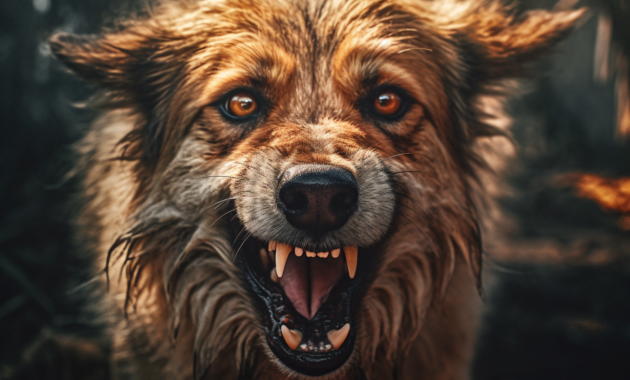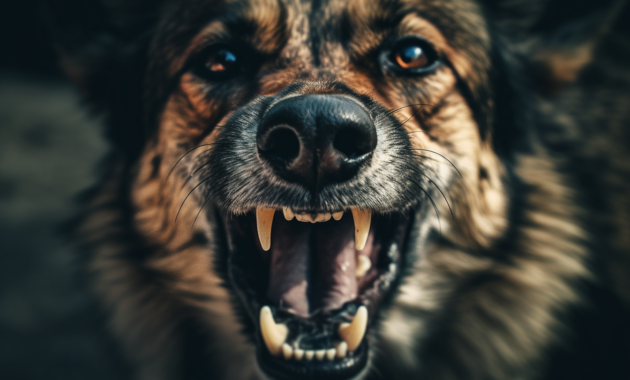
Dogs can remarkably communicate with us in a language all their own.
But sometimes, their barks can be challenging to interpret. It can be worrying and confusing if your dog barks at other dogs.
Fortunately, there are some reasons why this behaviour might be happening – and ways to help your pup feel more comfortable around other canines.
As an animal behaviourist, I’m here to help you understand why your dog is barking at other dogs and how you can address the issue.
When a dog barks at another canine, it’s usually because they feel threatened or anxious. It could be that they’re not used to being around other dogs or feel unsafe in their presence.
Pay attention to your pet’s body language when out and about – if their tail is down and they seem tense, this may be a sign that they need help calming down.
With patience and understanding, you can help your pup become more relaxed when meeting new furry friends.
Table of Contents
- The Causes Of Anxiety-Related Barking
- Examining Your Dog’s Body Language
- Understanding The Context Of The Barking
- Training Your Dog To Be More Comfortable Around Other Dogs
- Reducing Your Dog’s Stress And Anxiety Levels
- Frequently Asked Questions
- How Do I Know If My Dog Is Barking Out Of Anxiety Or Excitement?
- What Is The Best Way To Introduce My Dog To Other Dogs?
- Is It Possible To Reduce My Dog’s Barking Without Changing Their Behavior?
- How Do I Know If My Dog’s Barking Is A Problem?
- What Are The Signs That My Dog Is Feeling Anxious Or Stressed?
- Conclusion
The Causes Of Anxiety-Related Barking

Dogs bark for countless reasons, but anxiety is often the culprit when barking at other dogs.
Our canine friends are social animals and naturally want to interact with other canines; however, sometimes fear or anxiety can take over and cause them to bark excessively in response.
As pet owners, we must understand the causes of this behaviour to help our beloved four-legged companions learn how to interact with other dogs calmly.
The first step towards managing this issue is understanding why your dog may feel anxious around other dogs.
Often, dogs bark at strange dogs due to a lack of socialization or exposure to different breeds during puppyhood.
If this is the case, you will need to gradually introduce your pup to various doggy situations by socializing safely and rewarding calmness for desensitization and counter-conditioning techniques to take effect.
In addition, it’s possible that your dog could be displaying a “fearful-aggressive” response as an attempt to protect themselves during a perceived threat.
This type of behaviour is generally seen when one dog is fearful of another’s size or stature; because they feel threatened, they will bark out at it to make the situation safer for themselves.
For your pup to become more comfortable around larger or intimidating-looking canines, you should provide positive reinforcement whenever they display clear body language near another dog and avoid punishing them for their barking behaviour.
SEE ALSO
Dog Breeds Beginning With P
Dog Breeds By Intelligence And What Type Is Right For Me?
Examining Your Dog’s Body Language

Observing their body language and behaviour is essential when your dog barks at other dogs.
As veterinary or animal behaviourists, we recommend that all owners pay close attention to how their dog interacts with other canines.
If you see signs of aggression, such as growling, lunging, or snarling, it may be best to separate them immediately and try to distract your pup with positive reinforcement.
It is also important to socialize puppies early on to help them learn how to interact with other dogs. Early exposure helps create positive experiences that can shape how they respond to future encounters.
Introducing them slowly and positively will help them become more comfortable around other animals.
Keeping up with regular training for your pup will also ensure that the level of barking stays under control when meeting new dogs.
Positive reinforcement techniques such as treats or toys teach good behaviour when encountering other animals.
This reward system can help provide a sense of calmness and stability in unpredictable situations like this one.
Understanding The Context Of The Barking

Understanding why a dog may be barking at other dogs is essential. As veterinary behaviourists or animal behaviourists, we recommend that owners take the time to observe their pet’s body language and vocalizations when around other animals.
This can help owners understand why their dog may be barking at other dogs and provide socializing tips for managing this behaviour.
Often, dogs bark at other canines due to an excess of energy. When a pup has too much power, it may become excited and overwhelmed in the presence of another dog, resulting in them barking to express its feelings.
If this is the case, energy management techniques are essential. Owners should ensure that their furry friend gets enough exercise and mental stimulation with activities like puzzle toys or training sessions.
It is also important to note that some dogs bark out of fear or insecurity.
If a pup displays signs of discomfort, such as crouching or freezing, upon seeing another dog, it could indicate that they fear other animals and need extra support from their owners during socialization outings.
Creating positive experiences through reward-based training is an effective way to help build confidence and reduce anxiety in these situations.
Training Your Dog To Be More Comfortable Around Other Dogs

Socializing your dog is vital in helping them feel comfortable around other dogs.
Introducing them to other canines in a controlled and positive setting can help your puppy develop the skills necessary for healthily interacting with other doggies.
Here are some tips for socializing your pup:
First, start with short sessions and keep it positive.
Introduce your dog to just one or two other dogs at a time and use positive reinforcement such as treats and verbal praise when they successfully interact with their canine friends.
Also, pay attention to their body language—if they seem scared or uncomfortable, take a break immediately.
Next, provide structure and consistency while socializing.
This means keeping consistent rules during playtime, such as ‘no biting’ or ‘no jumping’. Encourage appropriate behaviour through compatible commands and rewarding good behaviour with treats and love.
Also, never force them into interactions if they’re not ready for it—give them plenty of space to explore on their terms when meeting new dogs.
Finally, continue to practice these socialization techniques regularly.
Whether at the dog park or walking with your pup, consistently inspire good behaviour using positive reinforcement techniques.
With patience and persistence, you can help create an environment where your four-legged friend feels safe and confident around other furry pals!
Reducing Your Dog’s Stress And Anxiety Levels

Does the environment your dog is in play a role in why they bark at other dogs?
Your dog may feel stressed or anxious around other dogs, and they may be trying to protect themselves by barking.
This theory can be tested by observing how your dog behaves in different environments.
| Environment | Observed Behavior |
|---|---|
| Around familiar people and animals | Relaxed and confident |
| Around unfamiliar people and animals | Anxious, fearful, or aggressive barking |
As a veterinarian behaviourist, I suggest safeguarding boundaries for your pup when around other dogs.
Working on positive reinforcement with them will help them become more comfortable in social situations – both with humans and animals.
Treats are an excellent reward for good behaviour!
If you notice any out-of-character behaviours from your pup, it might be a sign that they feel overwhelmed or scared.
Ensure they have plenty of love and support to help reduce their stress and anxiety levels.
Frequently Asked Questions
How Do I Know If My Dog Is Barking Out Of Anxiety Or Excitement?
Understanding why your dog barks at other dogs can be challenging to determine.
If you think your pup may be showing signs of anxiety or excitement, remember a few tips.
First, socialization is critical for your pup if they’re feeling anxious. Consider taking them to puppy classes or having play dates with other dogs in the area.
It’s also essential to use positive reinforcement when working with an anxious pup; rewards such as treats and verbal praise can help encourage more desired behaviours.
Lastly, ensure that you remain calm when engaging with your pup so they don’t start feeling overwhelmed with their emotions.
These simple tips can help identify if your pup is barking out of anxiety or excitement!
What Is The Best Way To Introduce My Dog To Other Dogs?
The best way to introduce your dog to other dogs is to use positive reinforcement techniques and socializing tips.
Start by finding a friend or family member with a calm, friendly and well-socialized dog.
Introduce your pup on neutral ground, such as a park or open area away from home.
Ensure both dogs are leashed and give them time to meet and greet one another at their own pace.
If one of the dogs becomes fearful or aggressive, separate them immediately, but then try again in a few days with more distance between the two animals.
Positive reinforcement techniques such as treats and verbal praise will help create good memories for your pup when interacting with other dogs.
Is It Possible To Reduce My Dog’s Barking Without Changing Their Behavior?
Yes, reducing your dog’s barking without changing its behaviour is possible.
This can be achieved by helping them improve socialization skills and noise aversion.
Provide your pup with the opportunity to interact with unfamiliar dogs in a safe and controlled manner. This can help them become more comfortable when they encounter other dogs.
Additionally, introducing them to different noises like thunder and fireworks in a positive way can help your pup form positive associations with loud noises, reducing their urge to bark or become anxious.
With patience and practice, your pup can learn to control its barking when presented with new stimuli.
How Do I Know If My Dog’s Barking Is A Problem?
Are you concerned that your dog’s barking may be a problem?
If so, it is essential to recognize the body language and behaviours they display while barking.
By understanding their body language, you can learn when they are simply communicating or if their behaviour needs modification.
As a veterinary behaviourist, I highly recommend observing and recognizing your dog’s body language when they bark at other dogs or people. This will help you assess whether their barking is a problem and how to address it with behaviour modification.
What Are The Signs That My Dog Is Feeling Anxious Or Stressed?
Your dog’s barking can be a sign of anxiety or stress, but there are other signs that you should look out for too.
If your pup displays excessive panting, yawning, drooling, trembling, or cowering, these could indicate they are feeling anxious.
Training your pup with positive reinforcement and socialization methods can help them feel more secure and less stressed in certain situations.
Recognizing the signs of stress in your pet will help you better understand when they need extra love and attention.
Conclusion
We must be aware of our dog’s behaviour and address any issues.
Dogs bark for a variety of reasons, ranging from anxiety to excitement.
With patience and proper training, reducing or even eliminating your dog’s barking when they are around other dogs is possible.
Interestingly, studies have found that over 50% of canine owners have had difficulty controlling their dog’s barking at one point or another.
As a veterinarian behaviourist, I believe the key to addressing this issue is understanding why your pet is barking and how you can modify their behaviour. Hence, they are less likely to bark in the future.




